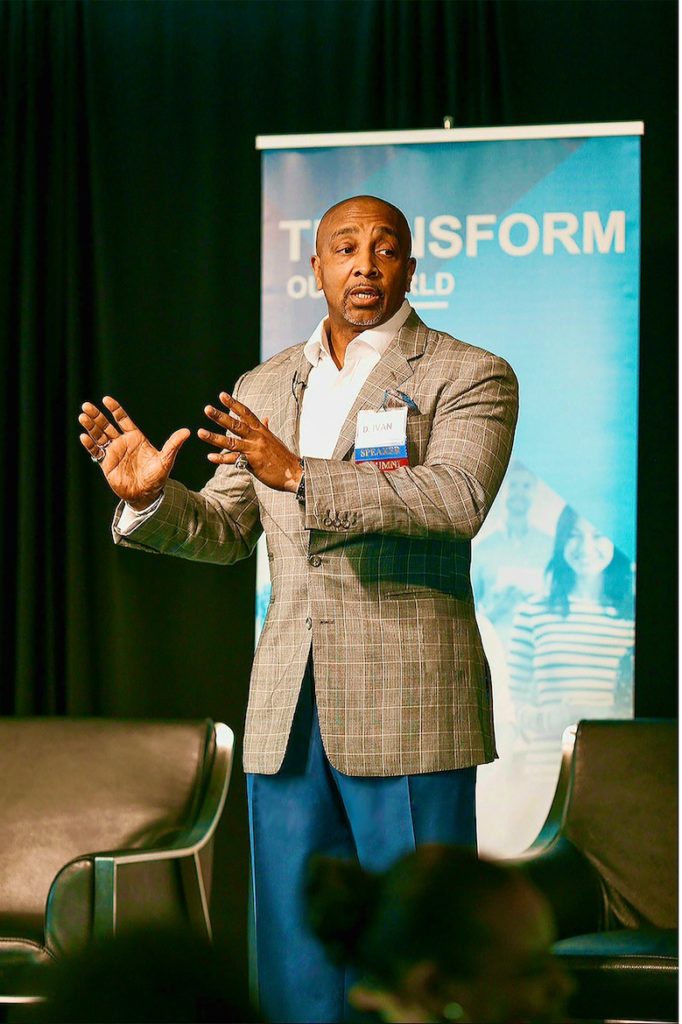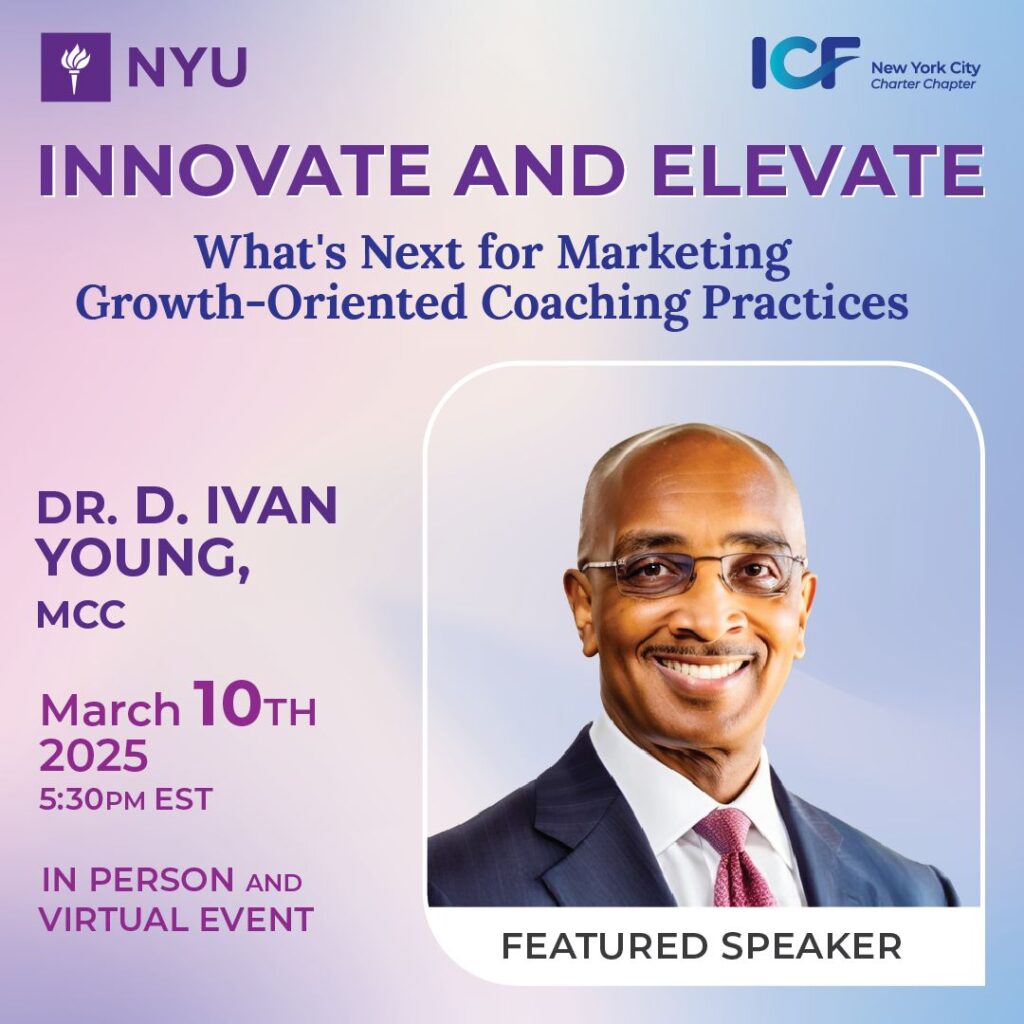
The Future of Coaching: Key Industry Trends
The coaching industry is undergoing rapid transformation, and those who adapt will thrive. As an industry leader, I’ve witnessed firsthand how the business of coaching is evolving. On March 10th, 2025, I will be sharing key insights at NYU’s Coaching Business Development Conference. My focus is on helping coaches navigate this ever-changing landscape and build a sustainable, profitable practice. To be part of the future of the coaching business development strategies for success in 2025 is a critical element.
Challenges Coaches Face in Scaling Their Business
The demand for professional coaching is stronger than ever. As a result, organizations and individuals increasingly recognize that coaching drives personal and professional success. Nevertheless, with rising competition, shifting client expectations, and evolving digital trends, coaches must be more strategic in how they position themselves and grow their businesses.
Coaches can no longer rely on word-of-mouth referrals alone. In today’s landscape, building a thriving coaching practice requires a data-driven approach, strategic marketing, and scalable business models. Ultimately, those who embrace these changes will define the future of the coaching industry.
Relying solely on one-on-one coaching limits both income and impact. High-performing coaches diversify their revenue through:
- Online Courses & Memberships – Offering digital programs that generate passive income.
- Corporate Coaching & Leadership Training – Working with businesses to develop high-performing teams.
- Speaking Engagements & Masterclasses – Establishing authority while reaching a wider audience.
- Book Publishing & Thought Leadership – Strengthening brand positioning with long-term visibility.
By incorporating scalable offerings, coaches ensure financial stability and expand their influence.
3. Building Authority Through PR and Media
Visibility matters—now more than ever. Coaches who consistently establish a strong media presence not only attract high-paying clients but also open doors to speaking invitations and lucrative corporate partnerships. In today’s competitive landscape, being seen as an authority in your field is no longer optional—it’s essential.
That’s why investing in strategic PR initiatives, such as guest articles, podcast interviews, and industry conference appearances, is a game-changer. When executed effectively, these efforts not only expand your reach but also position you as a go-to expert in your niche. Moreover, being featured in major publications doesn’t just enhance your credibility—it fosters trust, strengthens your brand, and keeps you top of mind with your target audience. Ultimately, the more visible and credible you are, the greater the opportunities that will come your way.
For more on niche marketing, visit Harvard Business Review or explore strategies from Forbes Coaches Council.
Key Takeaways for My NYU Talk: Elevate Your Coaching Business
1. Personal Branding: The Key to a High-Value Coaching Practice
Your brand is your greatest asset—it’s the foundation of your success. A coaching business is not just a collection of services; rather, it’s an ecosystem built on trust, credibility, and authority. More than anything, your brand shapes how potential clients perceive you and determines whether they see you as an expert or just another option.
That’s why a strong brand must convey confidence, expertise, and consistency. When you take the time to refine your messaging, showcase compelling success stories, and highlight what sets you apart, you don’t just attract attention—you attract premium clients who value your expertise. As a result, you open the door to long-term business opportunities, strategic partnerships, and a reputation that commands respect. Ultimately, the strength of your brand dictates the impact and longevity of your coaching practice.
2. Digital Marketing Strategies for Sustainable Growth
A thriving coaching business requires an intentional marketing strategy. Key digital growth tactics include:
- SEO Optimization: Ranking high on Google for coaching-related search terms to attract organic traffic.
- Social Media Engagement: Using LinkedIn, YouTube, and Instagram to connect with potential clients.
- Speaking & Networking: Leveraging public appearances to build trust and establish credibility.
- Corporate Partnerships: Aligning with HR leaders, businesses, and institutions for long-term contracts.
Implementing these strategies ensures consistent growth and client acquisition.
3. The Role of AI in Coaching: A Competitive Edge
AI is enhancing coaching practices by providing real-time insights, automation, and personalized learning experiences. Top AI-driven advancements include:
- Behavioral Insights: AI-powered assessments help coaches identify client patterns more effectively.
- Automation Tools: Scheduling, client tracking, and communication become more efficient.
- Customized Learning Paths: AI-driven programs adapt to individual coaching needs, improving outcomes.
Understanding and integrating AI tools will set forward-thinking coaches apart in the evolving industry landscape.
Preparing for the Future of Coaching – Strategies for Success in 2025
To build a coaching practice that thrives in 2025 and beyond, adaptability is crucial. Success will come to those who:
- Master niche positioning for a competitive advantage.
- Develop multiple revenue streams beyond one-on-one coaching.
- Leverage PR and media to establish thought leadership.
- Integrate technology to enhance coaching delivery.
- Commit to ongoing professional development and innovation.
Coaching isn’t just a profession—it’s a powerful movement that transforms lives. As the industry continues to evolve,only those who adapt will thrive. That’s why I’m honored to speak at NYU’s Coaching Business Development Conference, where I’ll be sharing game-changing strategies that not only set high-performing coaching businesses apart but also equip you with the tools to stay ahead.
If you’re truly committed to elevating your coaching practice, then now is the time to take action. These strategies will not only help you navigate the future with confidence but also position you at the forefront of an industry that demands innovation and resilience. Furthermore, as we’ll explore at NYU, the next generation of coaching leaders won’t just follow trends—instead, they will create them, drive change, and leave a lasting impact.
So, the question is: Are you ready to step into that future? If so, let’s build it together.
Dr. D Ivan Young, MCC, is a recognized expert in behavioral neuroscience and executive relationship coaching, working with high-net-worth individuals, licensed professionals, public figures, and entrepreneurs. With over two decades of experience in behavioral psychology and executive development, A three-time TEDx speaker with over 4.5 million views, Dr. Young has contributed to discussions on CNN, ABC, MSNBC, CBS, Essence, and Forbes, offering insights on human behavior, leadership, and personal transformation. His approach combines evidence-based coaching, neuroscience, and objective assessments to support lasting change.

